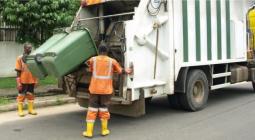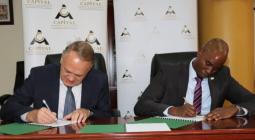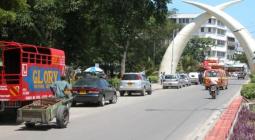CAMEROON: Faced with urban congestion, Yaoundé plans Bus Rapid Transit

While the populations of Dar es Salaam in Tanzania or Johannesburg in South Africa use the Bus Rapid Transit (BRT) on a daily basis, Cameroon is waiting for the launch of its "Trans-Yaoundé" project, which will link the Olembé and Ahala areas over 22 kilometers, with the development of ecological mobility in the Cameroonian capital at stake.
The Cameroonian authorities are preparing the launch of the “Trans-Yaoundé” project announced in 2019. At a total cost of around 120 billion CFA francs (nearly 183 million euros), construction work on the Bus Rapid Transit (BRT) infrastructure in the Cameroonian capital should start in the second half of 2023 “if certain prerequisites are met” as part of the Sustainable Urban Mobility Plan (Pmus) supported by the Yaoundé City Council.
The initiative implemented jointly by the Cameroonian Ministry of Housing and Urban Development (Minhdu), and that of Public Works has the financial and technical support of several development partners. These include the French Development Agency (AFD), the German Agency for International Development Cooperation (GIZ) and the European Union (EU).
The very first BRT in this Central African country will initially consist of 52 buses serving 43,000 passengers daily in Yaoundé by 2028. According to our colleagues at EcoMatin, the future bus line will connect the Olembé stadium, the Messassi district, the administrative center of Etoudi (which houses the presidential palace), the city hall and other busy points such as the central market, the central post office and the Mvan crossroads.
Decarbonization of urban transport
This project is envisaged in a context marked by strong demographic growth and air pollution peaks. This phenomenon is accentuated by the carbon dioxide (CO2) emissions generated by the national car fleet. In 2018, it was composed mainly of 190,000 thermal vehicles, according to official figures. In view of the situation, the government of Cameroon is inspired by other countries such as Senegal, whose recently commissioned BRT Dakar, has the wind in its sails in these times of soaring fuel prices on the continent and elsewhere in the world.
Read also-AFRICA: Switzerland finances the roll-out of eWaka’s electric bikes
This rush towards public transport modes that emit less greenhouse gases (GHG) could attract investors in the mobility sector in Cameroon. A few months ago, Nigerian start-up Metro Africa Xpress (MAX.ng) raised $100 million in 2023 from London, UK-based venture capital firm Lightrock, among others, to roll out its electric motorcycles in ten African countries, including Cameroon, Uganda and Egypt.





